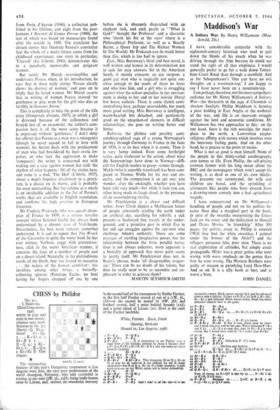Maddison's War
A Solitary War. By Henry Williamson. (Mac- donald, 25s.) I HAVE considerable sympathy with the eighteenth-century historian who used to pull down the blinds of his coach when he was driving through the Alps because he could not stand the sight of all that emptiness. I would generally prefer to go for a walk down Totten- ham Court Road than through a cornfield. And as for Schopenhauer's 'One can have no evil thoughts on a mountain-top,' I am happy to say I have never been on a mountain-top.
I am perhaps, therefore, not the most sympathetic audience for Mr Henry Williamson's A Solitary War—the thirteenth in the saga A Chronicle of Ancient Sunlight. Phillip Maddison is farming a poor holding in East Anglia at the outbreak of the war, and life is an incessant struggle against the land and economic conditions. Mr Williamson has two approaches to this: on the one hand, there is the rich nostalgia for man's place in the earth, a Lawrentian crypto- religious affinity with nature which involves even the beetroots feeling panic. And on the other hand, he is precise to the point of mania.
What is not so good is man himself. None of the people in this thinly-veiled autobiography ever comes to life. Even Phillip, the self-pitying yeoman farmer with his long moan about the BBC and the newspapers which won't accept his writing, is as dead as one of his own thistles. The peasants are stereotyped, the wife and children are banal, and the sprinkling of aristocrats like people who have strayed from a drawing-room comedy into a bad agricultural tragedy.
I have concentrated on Mr Williamson's handling of people and not on his politics be- cause these play a marginal part in the book, in spite of the swastika overprinting the Union Jack on the cover and the dedication to Oswald and Diana Mosley 'in friendship.' After 300 pages, the politics creep in. Phillip is arrested Mill they find the white swastikas I painted under the bonnet of the Alvis?') and the villagers persecute him, poor man. There is no real exploration of attitudes, but simply crude propaganda. Hitler was a great genius who went wrong, with more emphasis on the genius than how he went wrong. The Western Brothers were guilty of treason in parodying Lord Haw-Haw. And so on. It is a silly book at best, and at worst a bore.
JOHN DANIEL


































 Previous page
Previous page